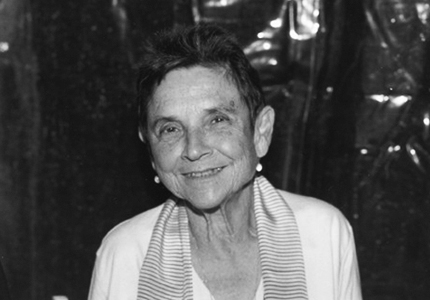World of Letters: The Beginnings of Adrienne Rich
 Adrienne Rich is unforgettable. Last month, we announced the winner of the 2012 Younger Poet Series competition, and beginning our celebration of Poetry Month in April, it takes little effort to remember one of YSYP’s best and greatest poets. The world was sad to note her passing last Tuesday, March 27, but the language of this most noteworthy American poet is her lasting gift, one that is sure to reward us more and more, just as it has in the 61 years since she was first published.
Adrienne Rich is unforgettable. Last month, we announced the winner of the 2012 Younger Poet Series competition, and beginning our celebration of Poetry Month in April, it takes little effort to remember one of YSYP’s best and greatest poets. The world was sad to note her passing last Tuesday, March 27, but the language of this most noteworthy American poet is her lasting gift, one that is sure to reward us more and more, just as it has in the 61 years since she was first published.
Born May 16, 1929 in Baltimore, Rich was encouraged from an early age to write poetry. Her father took a special interest in her education and that of her younger sister, Cynthia, and Rich herself would later comment that her father intended for her to be a “prodigy.” After finishing high school, Rich enrolled at Radcliffe College, where she continued to study and write poetry.
Meanwhile since 1947, W.H. Auden had been serving as judge of Yale University Press’s Yale Series of Younger Poets Competition, a position he would hold until 1959. His run as series judge brought to light poetry collections from promising mid-century poets like John Ashberry, W.S. Merwin, and John Hollander. In 1951, Rich’s final year at Radcliffe, Auden selected her submission, A Change of World, as the winner of the competition and subsequently wrote the introduction to her first published book. The prestige of the literary award and Rich’s own poetic brilliance and use of form would establish her writing career in the time-honored way that Yale Younger Poets beautifully achieve.
Over the next six decades, Rich challenged convention and conformity alike with her writing. She wrote more than thirty volumes of poetry and prose, the last of which was published by W.W. Norton in 2010, her publisher since the publication of her fourth poetry collection in 1966. Her single identification as a woman evolved into many: as a feminist, a lesbian, and increasingly as a Jew, as the years went on and she began to reflect on her father’s family heritage. As the New York Times reported in an obituary last week, “For Ms. Rich, the personal, the political and the poetical were indissolubly linked,” and as part of the New Left of the 1960s and 1970s, she was involved in civil rights and feminist activism, and turning her writing towards themes of womanhood and motherhood. Following her the end of her marriage to Harvard economics professor Alfred Conrad, Rich came out as a lesbian and began to publish in prose, as forceful and effective as her poetry, about identity politics and the question of rights in the United States. She is best known through this second half of her life, but for YUP’s acquaintance, we remember most the one packet—of the hundreds and thousands of submissions—that started it all and simply read:
Adrienne Cecile Rich.


























